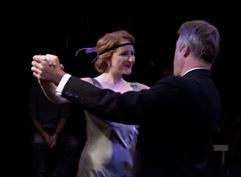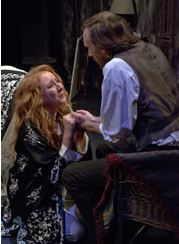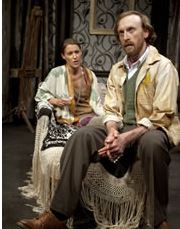Finborough Theatre Presents Noel Coward's This Was A Man
It's taken 88 years to reach the stage but the wait was worth is, says Liz Vercoe
When the morality-defending Lord Chamberlain decided in 1926 to save British blushes and ban Noel Coward’s latest oeuvre, his own imagination must have been rather more rampant than the content of this smartly written observation about the dangers of marrying the wrong person for the wrong reasons.
His patronising censorship pen must have assumed that one viewing of this play would result in people leaping into adulterous beds and, shock, horror, getting divorced.
Or perhaps he couldn’t bear the play underlining the fact that after the first world war the world had changed. For ever.

Coward’s characters reveal that the upper classes, particularly the women, had too little to do that was constructive and that everyone was questioning the point of all the social rules that had previously governed life and now seemed meaningless. All those wartime deaths had been a wake up call.
First we meet successful artist Edward (Jamie de Courcey) confirming his suspicions that his wife Carol (Dorothea Myer-Bennett, strange how the cast’s real names sound more Coward than Coward’s) is having an affair with old “chum” Harry (Alex Corbert Burcher. See?).
Turns out she’s not being very discreet and in steps another old chum, Evelyn (Robert Portal) bristling with moustaches and indignation. Every inch the military man, with about as much understanding of women as a chicken, he’s decided that if his friend won’t bring the gal to heel, by gad he will.
All of this is accompanied by languorous martini sipping, dressing for dinner, or the ballet or the opera, and searching for a cigarette, which might or might not be found.
The whole setting in the tiny 50 seat Finborough is really beautifully dressed and designed by Simon Kenny and Jessica Knight. The off and on set sound, conjuring up the arrival of old taxis or wind-up-gramophone records, is also immaculate thanks to Max Pappenheim and director Belinda Lang.
Coward manages to slip in Evelyn’s natural preference for the company of men, particularly the army and Edward, rather than women, who he neatly packages into the idolisation of a lost love (who escaped, wise girl) and his mother.
Alongside Evelyn’s would-be bromance, we get three women representing different faces of Eve and none being particularly sisterly to the other. There’s a lot of talk along the lines of “I know her type”.
With Carol, who is written off as a sexually driven she-devil, we meet Margot (Grace Thurgood), modelling for her portrait by Edward. She is bored and beautiful and “uncoupled” but not ivorced from her husband (to avoid the danger of starting again with someone else…). She just loves gossip and passing it all on.
As Edward comments wearily, “reticence as a national quality is on the wane”, while complaining about people’s increasing willingness to share private affairs with comparative strangers. What would Coward make of social media?
And into the mix is dropped Zoe (Georgina Rylance), long time friend of Harry and back from a long trip abroad where she’d holed up while the dust settled on her scandalous divorce. Now she’s living at Claridges, so the settlement must have been OK.
Harry and she are enormously fond of each other and have a real understanding which is warm and supportive. But there’s never been a place for platonic male/female friendships in their world and they tiptoe round what they mean to each other.
While this play isn’t as sharply, sometimes cruelly, funny as many of his other plays, Coward’s third act after the interval ups the laughs. What is fun though is that you don’t really know anyone’s motivation or true character right until the end. All the leads turn out to be much more complex than when you first meet them.

In Coward’s skilful hands no one is all bad or all good, just human and generally getting some things right and some wrong.
Instead, he offers a healthy attack society for forcing unnatural constraints on people. And on the censor… when one character asks to see something happy with no sex at the theatre they’re told that won’t be a problem for, “there will be plenty of tickets”. Unlike this sell-out performance.
This was a Man runs to August 2, (with return tickets only available) and runs for 1 hour 50 minutes.
Call the Box Office 0844 847 1652.
July 25, 2014
